Jewish necklaces have long served as powerful expressions of identity, faith, and cultural pride. These pieces go beyond mere fashion—they carry deep spiritual significance and connect wearers to centuries of tradition. From the iconic Star of David to the Hamsa hand and Hebrew inscriptions, jewish necklaces blend religious symbolism with timeless elegance. Today, both Jewish individuals and those inspired by Jewish culture are embracing these accessories not only for their beauty but also for their emotional resonance. As modern designers innovate while honoring tradition, jewish necklaces continue to evolve into versatile pieces suitable for daily wear and special occasions alike.
Moreover, the growing interest in meaningful jewelry has elevated the popularity of everyday spiritual necklaces for jewish culture across diverse communities. Whether passed down through generations or chosen as a personal statement, these necklaces reflect values such as protection, unity, and devotion. In this article, we’ll explore the rich history behind common symbols, examine different styles available today, and guide you on how to choose, style, and care for your own piece. Understanding the depth behind each design ensures that wearing a jewish necklace becomes more than an aesthetic choice—it becomes an act of connection.
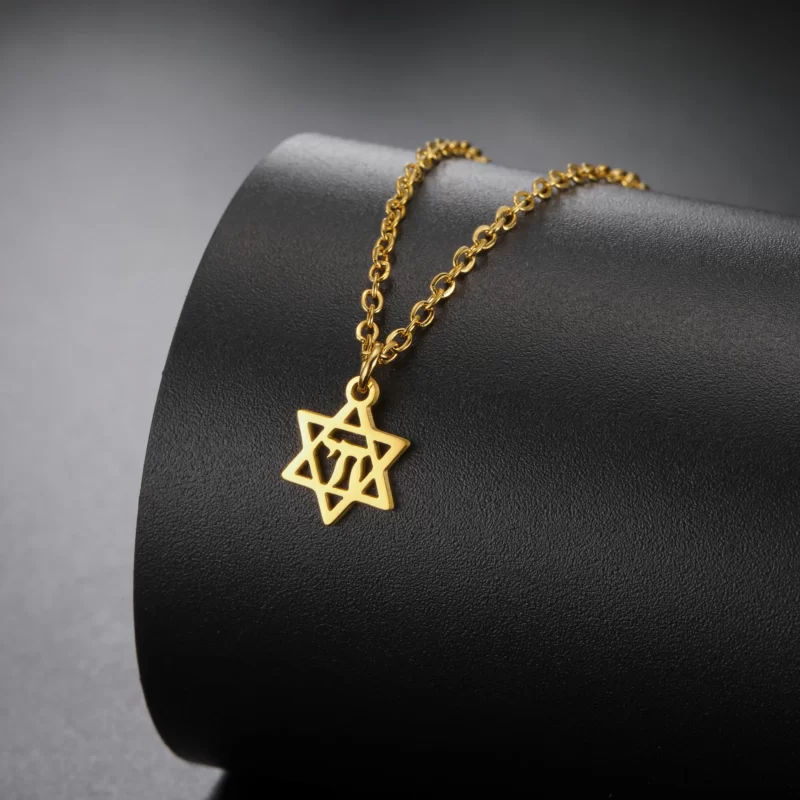 The Spiritual and Cultural Significance of Jewish Necklace
The Spiritual and Cultural Significance of Jewish Necklace
Jewish necklaces are much more than decorative items. They serve as tangible links to a vibrant heritage and often express core beliefs. Each symbol commonly found on these necklaces holds specific meaning, rooted in religious texts, historical events, or cultural customs.
For instance, the Star of David, also known as the Magen David, is one of the most recognized emblems in Judaism. While it gained widespread use in the 17th century, its origins trace back even further. Many believe it represents the shield of King David, symbolizing divine protection. Today, people wear it proudly as a sign of Jewish identity and solidarity.
Similarly, the Chai symbol—composed of two Hebrew letters meaning “life”—is frequently featured in jewish necklaces. Wearing Chai serves as a reminder of the sanctity of life and the importance of living with purpose. It’s especially popular during celebrations like birthdays and bar mitzvahs.
Another widely used motif is the Hamsa hand. Though not exclusive to Judaism, it has been embraced within Jewish culture as a protective amulet against negative energy. Often paired with the Star of David or an eye charm, the Hamsa brings peace and blessings to its wearer.
In addition, some jewish necklaces feature verses from the Torah or names written in Hebrew script. These personalized engravings add intimate value, making the jewelry deeply meaningful. For example, a mother might wear a necklace with her child’s name in Hebrew as a constant source of prayer and love.
Therefore, when someone chooses to wear a jewish necklace, they are often making a conscious decision to honor their roots or affirm their beliefs. This layer of intentionality sets these pieces apart from ordinary accessories.
Common Symbols Found in Jewish Necklaces
Several key symbols appear consistently across jewish necklaces, each carrying its own unique story and significance.
- The Star of David stands as the central emblem of Jewish identity. Its six-pointed shape is believed by some to represent the connection between God and humanity, with three points reaching upward and three downward.
- The Menorah, a seven-branched candelabrum, recalls the ancient Temple in Jerusalem. Modern versions sometimes depict the nine-branched Hanukkah menorah, symbolizing the miracle of light.
- Eyes of God or “Ayin Ha’ra” pendants aim to ward off the evil eye. Often incorporated into Hamsa designs, they serve as spiritual shields in daily life.
- Fish motifs appear due to their association with fertility and abundance in Jewish teachings. Additionally, fish scales resemble protective armor, reinforcing themes of safety.
- Tree of Life (Etz Chaim) designs illustrate the interconnectedness of all creation. This symbol comes directly from Proverbs 3:18 and is cherished for its message of wisdom and growth.
These symbols are not randomly selected. Instead, they reflect deliberate choices based on personal belief, family tradition, or spiritual aspiration. As a result, every jewish necklace tells a silent yet powerful story.
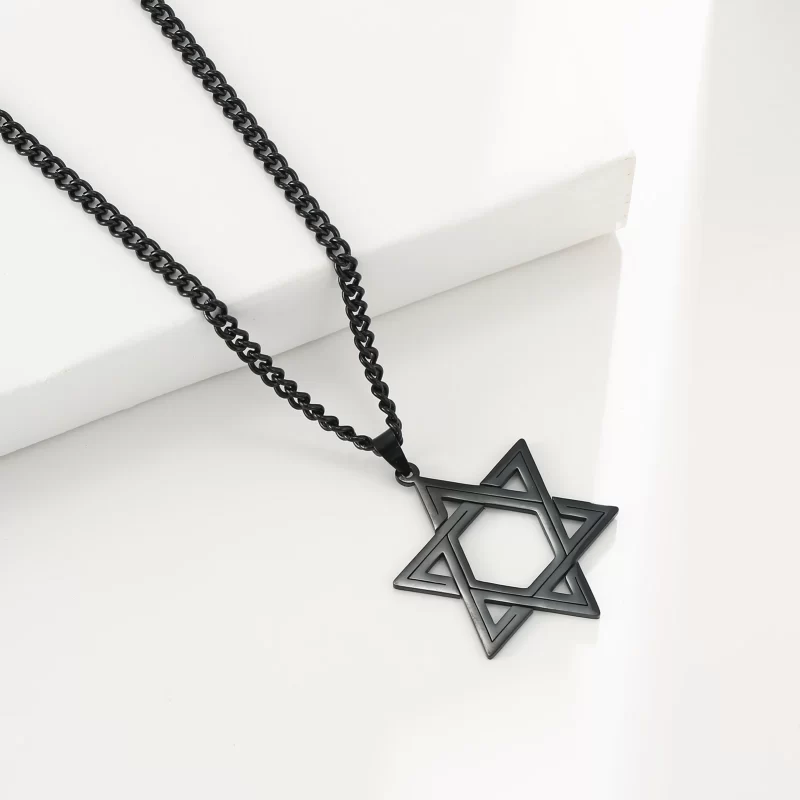 How Jewish Necklaces Are Made: Craftsmanship and Materials
How Jewish Necklaces Are Made: Craftsmanship and Materials
The creation of jewish necklaces involves careful attention to detail, respect for tradition, and high-quality materials. Artisans who specialize in this type of jewelry often combine ancient techniques with modern tools to produce durable and beautiful pieces.
First, many makers begin with precious metals like sterling silver, gold, or rose gold. Silver remains a favorite due to its affordability and lustrous finish. Gold, meanwhile, conveys luxury and timelessness, making it ideal for heirloom-quality items.
Next, skilled engravers hand-carve Hebrew letters or intricate patterns onto pendants. Laser technology now allows for precision, especially when reproducing delicate scripts or small symbols. However, handmade engravings still hold greater sentimental value for many buyers.
Chain styles vary widely. Popular options include cable chains, box chains, and figaro links. The choice depends on desired strength, appearance, and comfort. For heavier pendants, sturdier chains ensure longevity and prevent breakage.
Additionally, ethical sourcing plays an increasing role in production. Many brands now emphasize conflict-free gemstones and recycled metals. This commitment aligns with Jewish values of justice and responsibility toward the world.
Finally, quality control is essential. Each piece undergoes inspection to verify clarity of engraving, smooth edges, and secure clasps. Reputable sellers provide certificates of authenticity, especially for items made in Israel or under rabbinical supervision.
Because of this meticulous process, jewish necklaces maintain both aesthetic appeal and symbolic integrity. Buyers can trust that their jewelry honors tradition while meeting contemporary standards.
Where to Buy Authentic Jewish Necklaces
Finding genuine jewish necklaces requires knowing which sources prioritize authenticity and craftsmanship. Fortunately, several trusted avenues exist for purchasing meaningful pieces.
Online marketplaces like Etsy host independent jewelers who create custom designs. These artisans often share the inspiration behind their work and allow personalization, such as adding names or dates in Hebrew. Customer reviews help verify reliability before purchase.
Specialty websites focused on Jewish gifts and ceremonial items also offer curated selections. Stores like Judaica.com or TheZionistJewelry.com specialize in religiously significant pieces and frequently collaborate with Israeli designers. Their collections include everything from simple Stars of David to elaborate Torah-inspired pendants.
Brick-and-mortar stores, particularly those located near synagogues or in Jewish neighborhoods, provide hands-on shopping experiences. Seeing and trying on a necklace in person helps assess weight, shine, and fit. Staff members at these shops usually have deep knowledge about symbolism and can guide informed decisions.
Secondhand options should not be overlooked. Vintage jewish necklaces found at estate sales or antique shops may carry generational history. Before buying, inspect for hallmarks, metal purity, and signs of repair.
Regardless of where you shop, always check return policies and warranty information. A reputable seller will stand behind their product and offer support if issues arise.
By exploring multiple channels, you increase your chances of finding a truly authentic and personally resonant jewish necklace.
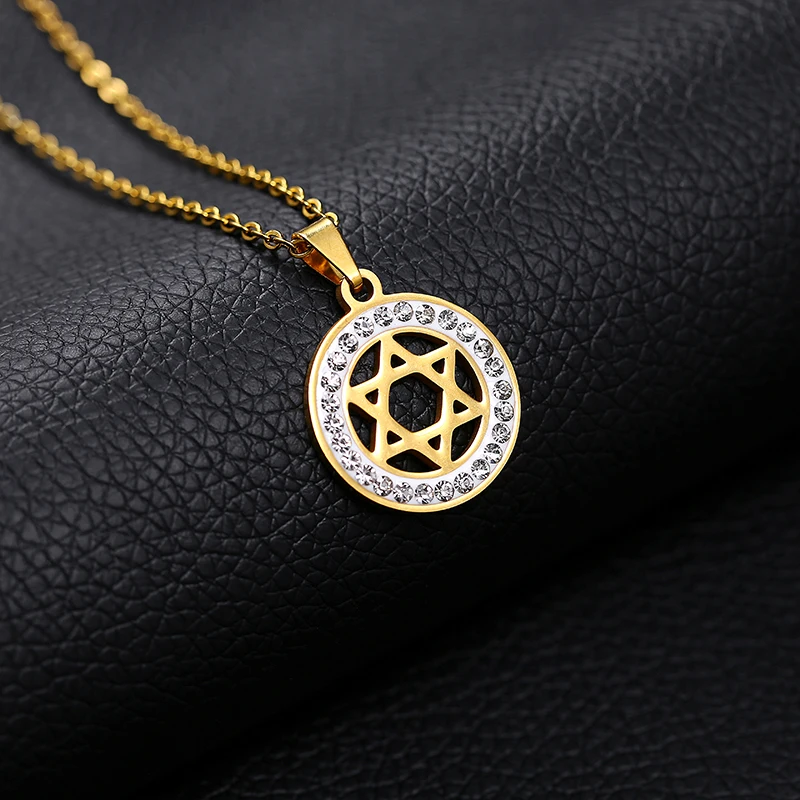 Styling Jewish Necklace for Everyday and Special Occasions
Styling Jewish Necklace for Everyday and Special Occasions
Wearing jewish necklaces doesn’t require a formal event or religious ceremony. In fact, integrating them into daily outfits enhances both style and spiritual awareness.
For everyday wear, opt for minimalist designs. A small Star of David on a delicate chain pairs well with casual shirts, blouses, or turtlenecks. Because it lies close to the collarbone, it remains visible without overpowering the look.
Layering works exceptionally well with jewish necklaces. Combine a short Chai pendant with a longer Hamsa chain for visual interest. Just ensure the metals match—mixing silver and gold can clash unless done intentionally.
During holidays like Hanukkah or Passover, bolder pieces take center stage. Consider a large Menorah pendant or a necklace engraved with “Miracles” in Hebrew. These make thoughtful gifts and conversation starters at gatherings.
For weddings and bat mitzvahs, elegant gold-plated jewish necklaces complement formal attire beautifully. Pair them with matching earrings and bracelets to complete a cohesive ensemble. Some brides even incorporate family heirloom necklaces into their bridal look.
Even non-Jewish individuals wear jewish necklaces respectfully. When done so with understanding and appreciation—not appropriation—these pieces foster intercultural dialogue and admiration.
Ultimately, how you style your jewish necklace depends on your intent and occasion. Whether subtle or striking, it becomes a reflection of who you are and what you cherish.
Factors to Consider When Choosing a Jewish Necklace
Selecting the right jewish necklace involves more than just aesthetics. Several practical and emotional factors contribute to a satisfying choice.
- Symbol Meaning: Identify which emblem resonates most with your beliefs. Is it protection? Faith? Family? Let personal values guide your selection.
- Metal Type: Decide between silver, gold, or platinum based on skin sensitivity, budget, and preferred color tone. Hypoallergenic coatings help prevent irritation.
- Pendant Size: Larger pendants make bold statements, while smaller ones suit professional settings. Think about visibility and comfort.
- Chain Length: Standard lengths range from 16 to 20 inches. Shorter chains sit higher on the neck; longer ones drape elegantly over clothing.
- Personalization Options: Many sellers offer engraving services. Adding a name, date, or blessing in Hebrew increases emotional value.
- Intended Use: Will you wear it daily or save it for ceremonies? Durable materials and secure clasps matter more for frequent use.
Taking time to evaluate these aspects leads to a more meaningful and lasting purchase. A well-chosen jewish necklace can become a lifelong companion.
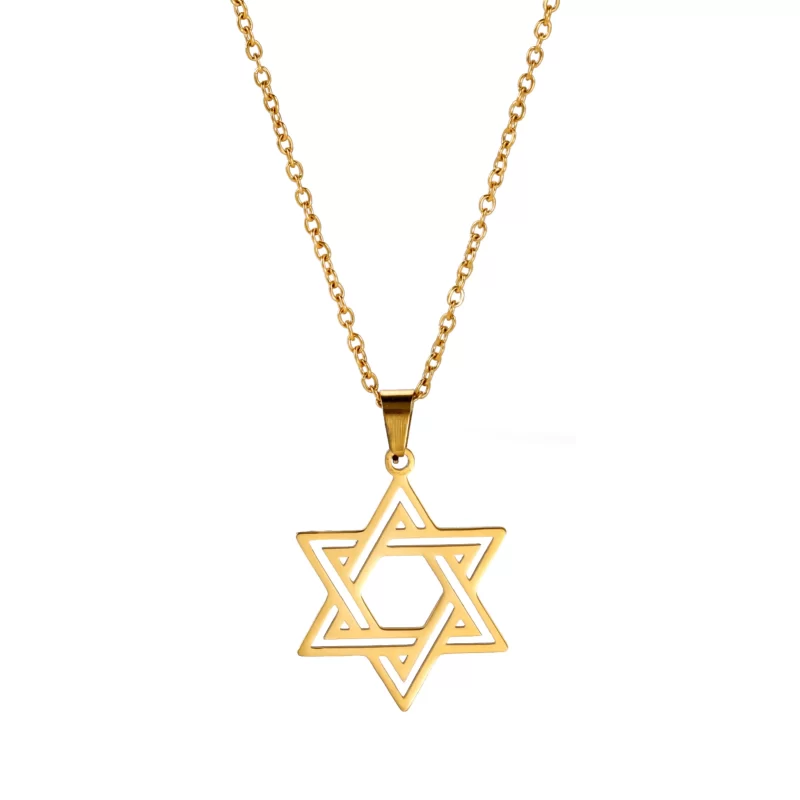 Why People Wear Jewish Necklaces Beyond Religion
Why People Wear Jewish Necklaces Beyond Religion
While deeply rooted in Judaism, jewish necklaces attract wearers from various backgrounds for reasons beyond faith.
Some view them as symbols of peace and unity. The Hamsa, for example, is respected across cultures including Islamic and Middle Eastern traditions. Its universal message of protection appeals to many.
Others appreciate the artistic beauty of Hebrew calligraphy. Even without understanding the language, people admire the flowing lines and symmetry of the script. It adds an exotic yet elegant touch to any outfit.
Additionally, celebrities and influencers have helped normalize these pieces in mainstream fashion. When public figures wear jewish necklaces, they spark curiosity and inspire others to learn about their meanings.
There’s also a rising trend toward “meaningful minimalism.” Consumers increasingly seek jewelry that tells a story rather than follows fleeting trends. Jewish necklaces naturally fit this movement due to their layered significance.
Lastly, many buy them as gifts. A jewish necklace given at a graduation, wedding, or recovery from illness carries heartfelt sentiment. It says, “I’m thinking of you,” in a profound way.
Thus, the appeal of jewish necklaces extends far beyond religious boundaries. They unite art, emotion, and spirituality in a single wearable form.
Frequently Asked Questions About Jewish Necklace
Can anyone wear a jewish necklace?
Yes, provided it is worn with respect and understanding. Appreciation differs from appropriation, so learning the symbolism shows mindfulness.
Is it appropriate to wear a jewish necklace if I’m not Jewish?
Many symbols like the Hamsa or Star of David are shared across cultures. As long as you honor their meaning, wearing them can be a gesture of solidarity.
How do I clean my jewish necklace?
Use a soft cloth and mild soap. Avoid harsh chemicals. Store separately to prevent scratches, especially if the pendant has engraving.
Do jewish necklaces come in gender-neutral styles?
Absolutely. Many designs are simple and symmetrical, making them suitable for all genders. Chains and pendants can be adjusted for preference.
Are there specific times when I should wear a jewish necklace?
While no strict rules apply, many wear them during prayers, holidays, or moments requiring spiritual strength. Others choose to wear them daily as a personal reminder.
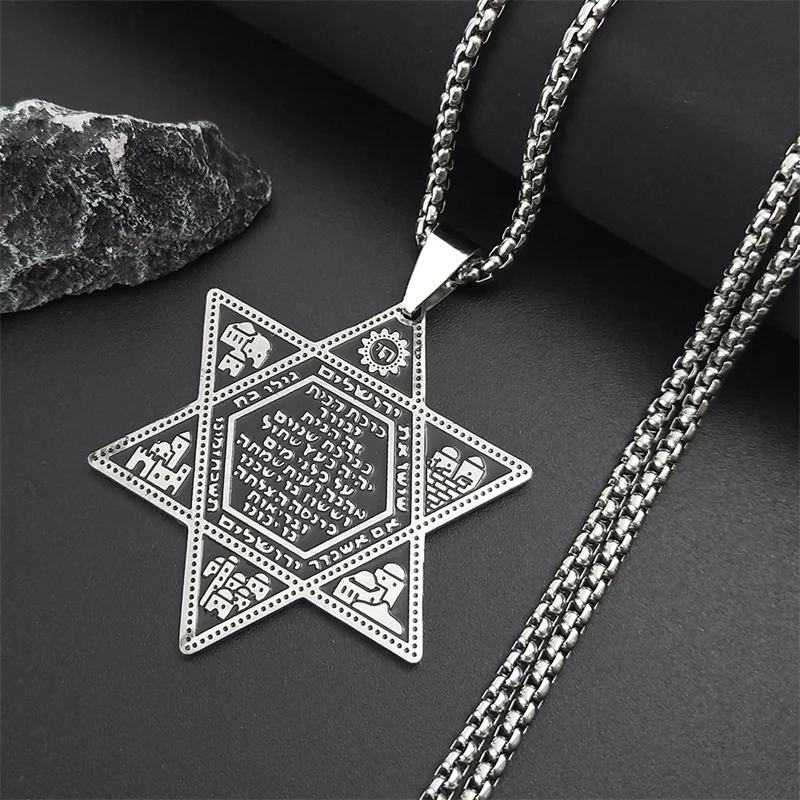 Final Thoughts: The Enduring Legacy of Jewish Necklace
Final Thoughts: The Enduring Legacy of Jewish Necklace
In conclusion, jewish necklaces remain enduring symbols of faith, culture, and personal expression. They bridge generations, preserve tradition, and adapt gracefully to modern tastes. Whether worn for religious reasons, cultural pride, or aesthetic pleasure, these necklaces carry weight far beyond their physical form.
As society grows more connected, the stories behind symbols like the Star of David or Chai gain wider recognition. More importantly, they invite dialogue, understanding, and mutual respect among diverse communities.
Choosing to wear affordable jewish necklaces for daily wear is ultimately a personal journey. It may begin with a desire for beauty—but often evolves into something deeper. And in that transformation lies the true power of this timeless jewelry.